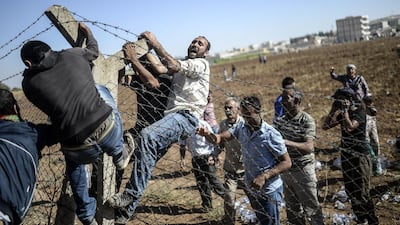LONDON // Britain has finally joined the US-led coalition against ISIL after weeks of considering options, as airstrikes by the US and its allies pounded the militants in Syria for a second consecutive day.
The UK parliament yesterday voted 524 to 43 to back prime minister David Cameron’s decision to join airstrikes on Iraq.
“This is not a threat on the far side of the world,” Mr Cameron told legislators. “Left unchecked, we will face a terrorist caliphate on the shores of the Mediterranean and bordering a Nato member, with a declared and proven intention to attack our country and our people.”
The coalition includes the UAE, which is taking part in airstrikes in Syria, and other Arab states.
A spokesman for Sheikh Abdullah bin Zayed, Minister of Foreign Affairs, said at the UN in New York that ISIL was a global threat and that the UAE condemned the flow of foreign fighters joining ISIL.
ISIL’s acts “confirm our belief that there is a common threat facing all member states, which requires a united effort in taking strict and immediate measures against it”, said Ahmed Al Jarman.
Meanwhile, ISIL fighters have tightened their siege around a key Syrian town on the Turkish border.
Coalition warplanes destroyed four tanks belonging to ISIL in eastern Syria yesterday, the US military said, targeting the militants in an oil-producing area that has generated millions of dollars in revenue for the extremists.
The strikes outside the city of Deir El Zour on the Euphrates River mar-ked the second consecutive day that the US and its Arab allies have taken aim at the militants near the border with Iraq.
Planes pounded a dozen makeshift oil-plants in the same area on Thursday, trying to cripple one of the militants’ primary sources of cash – black market oil sales that the US says produce up to US$2 million (Dh7.34m) a day. Syrian activists said the airstrikes hit the Tanak and Qouriyeh oilfields in Deir El Zour yesterday.
They said raids also hit ISIL’s base in the town of Mayadeen, south-east of Deir El Zour city.
The Observatory reported another raid on ISIL positions outside the city of Hassakeh in north-eastern Syria near the Iraqi border.
The strikes were aimed at an oil-production area, and at vehicles the militants had brought in from Iraq and tried to bury, said Observatory director Rami Abdurrahman.
The coalition, which began its aerial campaign in Syria on Tuesday, aims to roll back and ultimately crush the extremist group.
ISIL has declared a “caliphate” from lands it has seized across both sides of the Syria-Iraq border.
Along the way, the militants have massacred captured Syrian and Iraqi troops, terrorised minorities in both countries and beheaded two American journalists and a British aid worker.
The coalition air assault has targeted checkpoints, training grounds, oilfields, vehicles and bases, as well as buildings used as headquarters and offices.
Activists say the militants have cut back the number of gunmen manning checkpoints, fearing more strikes. Civilians have left ISIL strongholds in masses.
“Everywhere there are ISIL buildings, the people living around these buildings are leaving. They are moving far from ISIL buildings, either to other villages or to other areas in the same cities,” said Mr Abdurrahman.
“This has happened in Raqqa, in Deir El Zour and in many towns and villages.”
In towns and villages controlled by Syria’s mainstream rebel factions, the airstrikes have brought mixed reactions.
Most people appear to condone hitting ISIL but question why forces loyal to Syrian president Bashar Al Assad, which have killed thousands of people in the civil war, remain untouched.
Syrians are also critical of the US decision to bomb Al Qaeda-affiliated Jabhat Al Nusra in the opening salvo. Al Nusra has a degree of support among many in the opposition because its fighters are on the front lines against Mr Al Assad.
In several opposition-held areas, residents yesterday staged demonstrations condemning the airstrikes. A video posted online shows people in Idlib province denouncing the airstrikes.
One placard in English read: “What about the regime’s terrorism?”
The coalition campaign in Syria expands on the airstrikes the US has been conducting on its own against the extremist faction for more than a month in Iraq.
France joined the American effort in Iraq a week ago and is also considering whether to extend its airstrikes to Syria.
Denmark on Friday said it would send seven F-16 fighter jets to take part in the airstrikes in Iraq, two days after the Netherlands did so.
Belgium said yesterday said it would send six F-16s to conduct raids in Iraq.
Part of ISIL’s success is its ability to move quickly. The UK’s warplanes should improve the coalition’s chances of hitting the moving targets, said Ben Goodlad, a weapons analyst with IHS Jane’s.
“The introduction of RAF Tornado aircraft in a strike role will provide the coalition with an enhanced capability to engage moving targets such as vehicles, both lightweight and armoured,” said Mr Goodlad.
“This was demonstrated to great effect during the air operation against Libyan forces in 2011.”
The international operation targeting ISIL adds another layer to Syria’s civil war, a conflict that has already killed more than 190,000 people since the revolt against Assad began in March 2011.
While overshadowed by the coalition strikes against ISIL, fighting between Syrian government troops and rebels has raged on with its usual ferocity.
* Associated Press

